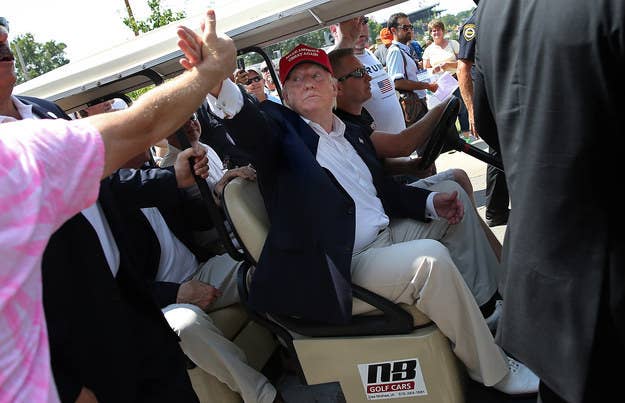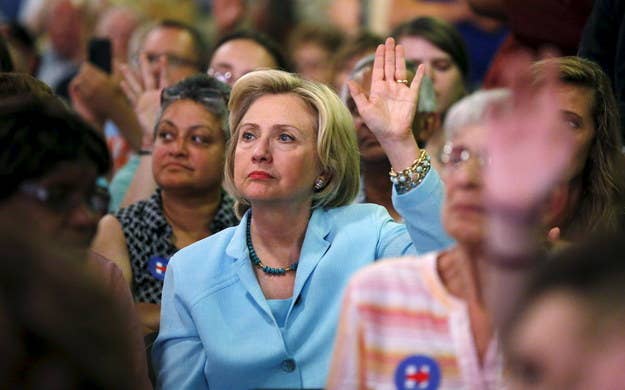
DES MOINES, Iowa – American politics reached a new level of weird for me when Donald Trump arrived at Iowa's state fair Saturday and proceeded to destroy everything in his path.
The Republican presidential candidate cantered on to the site flanked by his private security detail, his route through a crowd of thousands of corndog-eating Iowans cleared by state police, his "TRUMP"-branded helicopter hovering overhead like some political take on Apocalypse Now, his entourage blocking movement across the Midwest festival of excess, his every comment caught by 20 cameras and 300 smartphones, his sheer presence bringing the fair to a standstill.
"MOM! MOM! I TOUCHED DONALD TRUMP," screamed a child somewhere.
"He says what people say at home," said another, explaining Trump's appeal to a friend as the Trump circus passed by.
Everyone and everything at the fair — the prize cows, the crowds, the people selling deep-fried meats of dubious origins, the children being given free rides in his helicopter around the site — was suddenly subsumed into the presidential campaign of a delighted Donald Trump.
By contrast, if you bumped into former UK Labour leader Ed Miliband just before the recent general election then you'd probably have found him sitting on a train in second class, surrounded by a couple of aides, a press officer, and the odd member of the public asking for a selfie. I've seen the prime minister, David Cameron, with a smaller security detail than Trump had on call at the state fair.
What's more, Trump didn't even feel the need to pretend his visit to the fair had anything to do with politics. This is traditionally considered to be unusual for a political candidate. There was no stump speech at the Iowa soapbox, no pitch to the nation, almost no one in the crowd even heard what he was saying to CNN's cameras. Instead the crowd just chased their man across the site, cheered as he bit into a steak, and then chased his golf cart as he headed off to get the last helicopter out of Des Moines.
"He doesn't seem as fake as some of the other politics," explained Trump fan Jenny Moore, wearing a Confederate flag top as she struggled to get a photo of her hero.
"He has strong morals."
In part it comes down to the money, which doesn't flow as easily in British politics. Trump is well known in the UK for bizarre appearances on the Scottish coast where he argues with locals in the way of his development plans, in a country where privately wealthy politicians are treated with suspicion. What's strange to a Brit in the US is that the fawning crowds praise his wealth as a positive sign: confidence that he can't be bought by outside financial interests in a system they don't trust. After all, the Hillary Clinton campaign has already raised more money than any UK political party is legally allowed to spend in an entire election campaign.
In short, for Trump supporters it seems to be better the rich devil you know. And in Iowa at caucus time there's a lot of money being spent: TV stations are already stuffed with adverts proclaiming obscure Republicans to be the only people standing between the US and the end of civilisation.
Because Iowa in the run-up to caucus season seeps politics from every pore and the level of dedication to wooing the voters in a state that has just 1% of the country's population is astonishing. Candidates will turn up to the opening of an envelope if it means they get to meet a handful more potential backers.

At a gathering of the Democratic presidential candidates at the inexplicably named Wing Ding Democratic dinner in northern Iowa, the amount of time, money, and effort spent on winning over small numbers of residents in the Midwest state is on display.
Outside the venue — an all-American vintage ballroom of the sort Marty McFly goes to visit in Back to the Future — dozens of young supporters wave banners in support of potential Democratic nominee Martin O'Malley. "Give me an O!" they chanted. "Give me an apostrophe!"
No one in this sleepy town really seemed to be watching their efforts and there weren't any cameras filming them, so it's not entirely clear who the show was for or where they came from. Rumours were circulating — denied by O'Malley's team — that some of them had been paid to be there. What was astonishing to me was the idea was even realistic: That a political campaign barely registering in the polls for an internal party selection contest could potentially afford to spend any money at all.
Inside the hall, the overwhelmingly white and ageing crowd were told by the host to turn to the person sitting next to them, shake their hand, and say, "Thank you for being a Democrat", in a quasi-religious fashion. The national anthem was sung and veterans were told to stand. Republicans were booed, someone pretended to marry a lawnmower to celebrate same-sex marriage, and the entire national press corps was represented.
Clinton hung around at the end to shake hands and take photographs with as many people as possible. If you ever want access to power, move to rural Iowa and wait for the next presidential cycle.
Back at the state fair, other would-be candidates were queuing up to do what Clinton and Trump refused: stand on the Des Moines Register soapbox and take questions from the crowd. A regional Jeb Bush campaign volunteer offered me the chance to wave around one of the purposefully amateurish home-painted "Jeb!" signs that he'd brought along, presumably to add credence. There's an unreal feeling about the whole thing: slick campaigns, enormous press packs trying to get hints of a news line even for the borderline-irrelevant candidates, and yet all anyone wants to talk about is the billionaire with the helicopter.
Instead, it was self-starting Democratic presidential candidate Lincoln Chafee, a former governor of Rhode Island who is currently polling at around 0% in the state and has the tough job of being the standard bearer for candidates without any financial backing.
"I'm running a low-budget campaign," he told a thin audience that included several baffled paid activists, putting an optimistic spin on his situation.
"This is a chance to test whether it's all about money," he went on, referring to himself in the third person as he appealed to the handful of people not distracted by the glitz of Clinton or Trump's helicopter. "Are we going to [reject] Chafee who has the experience, the vision, but might not necessarily have the money?"
